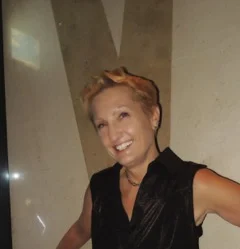The weather in San Francisco is erratic, but lovely. I turn a corner, get hit with a breeze, and pull on my jacket. Huff up a steep hill, jacket off. A couple of times, precipitation, too light to be called rain. Then bright skies, glad I applied sunscreen.
Take subway, called Bart, from Mission District to Powell, where a famous cable car runs up a steep hill. Two hundred people in line in front of us, but we’re not dissuaded. We stand for twenty minutes, during which only fifteen people are transported upward. Ridiculous. We opt to walk.
From Powell to Bush. Uphill, jacket off. To Chinatown Gate on Grant. Up, up, down, up, down. Chinatown, same items as Chinatown in Singapore—wooden combs, waving cats, tea—not as colorful because fewer outside displays. Also, on actual street with cars, not just for people walking like in Singapore. Puts us in the mood for dumplings—it’s been so long—but it’s too early for lunch.
Continuing through North Beach toward Fisherman’s Wharf. Sun shines, jacket off. North Beach, the Italian neighborhood, all about food. One restaurant after another. Oh, oh, the garlic. Mouth waters. Still too early for lunch. Onward.
Water. Jacket on. The bay is alive with ferries—six going all the time, different directions. Is that Alcatraz? Wanted to go out there, but apparently tickets are purchased in advance—next available booking, August thirty-first. It looks intriguing, small and solid, a cloud hovering above.
Turn right, up coast. Big man follows, shouting at the street, targeting no one, nasty language. He puts his insanity out there for everyone to see. Would definitely not be able to buy a gun.
David wants to turn into the fun Wharf, Thirty-nine. Carnival atmosphere. Music, color, happy tourists. But we made a plan—to follow the circle of the water, turn inland, make our way through downtown, and return to Chinatown for dumplings and reflexology.
“But if we go into Wharf Thirty-nine we’ll be deviating from the plan,” I tell him.
“We’re on vacation, we can deviate.”
“If you get hungry before we get to dumplings, and we end up having to settle for street food, don’t come crying to me.”
We were warned that this wharf is touristy—and it is. But festive and bright. Clean. We walk through, stop at the Left-handed Store for David’s amazement. Watch a magician for a few minutes. Once again, mostly all about food. As we exit the wharf, three tour buses release shorts and cameras. Good timing.
Turn inland, easily catch less famous cable car on California, uphill to Chinatown. Hanging off side, hair catching breeze. Whee!
Accidentally find best dumplings anywhere, except for Beijing. Yum. Pearl of the Orient, on Clay. After lunch, cross street to reflexology. Excellent. A little noisy—honking, sirens, shouting—but noise is ambient, out there, while in here, I float. At the end, an altercation. Demand twenty percent tip. A tip, yes. I’m a solid fifteen percenter. It’s a small difference. But a tip shouldn’t be demanded, palm open, door blocked; it is at the discretion of the tipper. Amount, also at the discretion. I want to get into it. I want to define the terms of tipping for them. I want to explain that it’s not up to them to demand and dictate, that the spirit of tipping is meant to be gracious on both sides.
“Let it go,” David says, handing over the few dollars. And I do.
All-in-all, we walk nine and a half miles, put twenty-two thousand steps on the Fitbit. (About the Fitbit, just received my third in less than a year. Either I’m so active that I wear the things out, or they’re just not that high-quality a product.)
Return to the room. Glass of wine. Out to dinner at Chapeau, a wonderful recommendation from my friend, Diana; and I’ve recommended it to another friend, Janet, who will be here this weekend. Later, fall into bed, exhausted.
A good day.
Building art in Chinatown
The parlor of Inn San Francisco
A colorful bright shop in Chinatown full of stuff nobody needs, which is what makes Chinatown fun.











